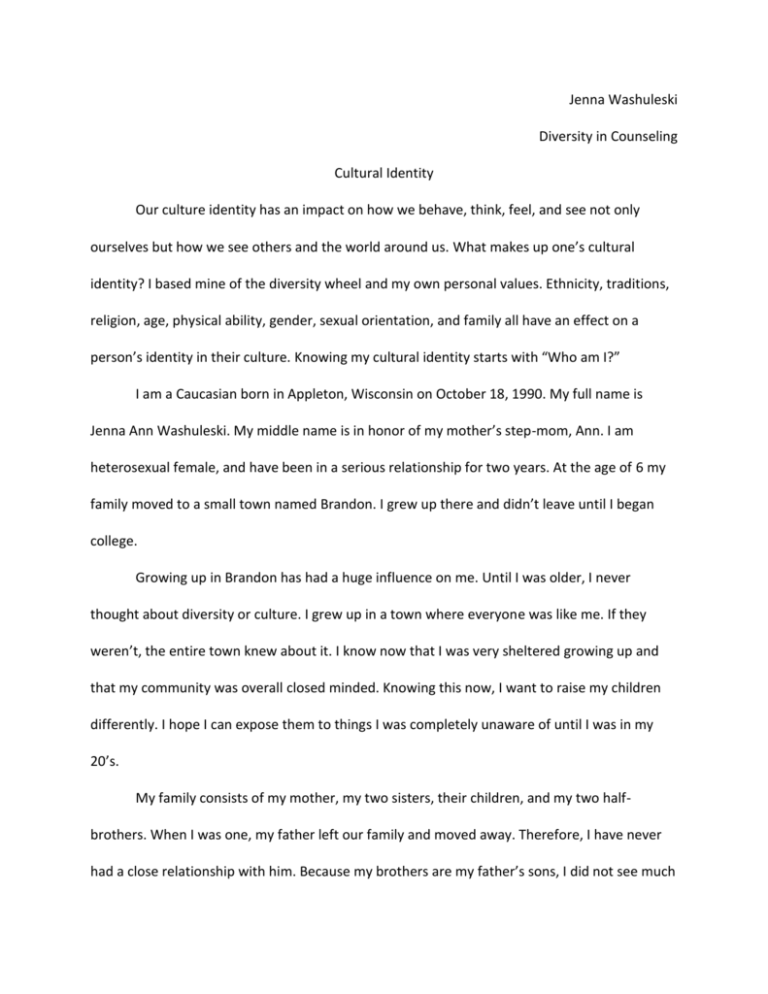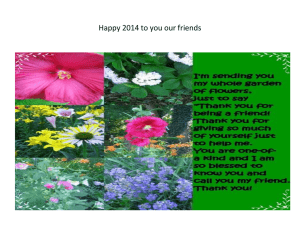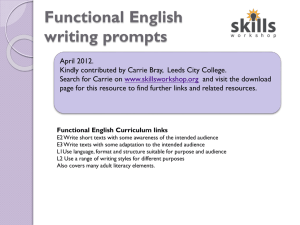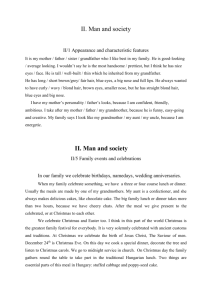Cultural Identity Reflection Paper
advertisement

Jenna Washuleski Diversity in Counseling Cultural Identity Our culture identity has an impact on how we behave, think, feel, and see not only ourselves but how we see others and the world around us. What makes up one’s cultural identity? I based mine of the diversity wheel and my own personal values. Ethnicity, traditions, religion, age, physical ability, gender, sexual orientation, and family all have an effect on a person’s identity in their culture. Knowing my cultural identity starts with “Who am I?” I am a Caucasian born in Appleton, Wisconsin on October 18, 1990. My full name is Jenna Ann Washuleski. My middle name is in honor of my mother’s step-mom, Ann. I am heterosexual female, and have been in a serious relationship for two years. At the age of 6 my family moved to a small town named Brandon. I grew up there and didn’t leave until I began college. Growing up in Brandon has had a huge influence on me. Until I was older, I never thought about diversity or culture. I grew up in a town where everyone was like me. If they weren’t, the entire town knew about it. I know now that I was very sheltered growing up and that my community was overall closed minded. Knowing this now, I want to raise my children differently. I hope I can expose them to things I was completely unaware of until I was in my 20’s. My family consists of my mother, my two sisters, their children, and my two halfbrothers. When I was one, my father left our family and moved away. Therefore, I have never had a close relationship with him. Because my brothers are my father’s sons, I did not see much of them growing up. That is, until I was 17. My brother Brad reached out to me about having a relationship, and the five of us children have been close ever since. Having a relationship with my brothers has been beneficial for many reasons. One of those reasons is that I got to learn more about my dad’s side of the family. My ancestors from my father’s side came to America from Prussia. My family settled in Marinette, Wisconsin. Over the course of the years, my great, great grandpa Frank had to change our last name. Jenna Wachulefsky. That is what my name should be. Frank Wachulefsky was unable to cash his paychecks because they misspelled his name as Frank Washuleski. He changed our name in order to cash his checks. My ancestors from my mother’s side are primarily German. Therefore, I say I am Prussian and German. I did not know much about my heritage before this class. I am going to continue to educate myself on my heritage and culture. Especially so I can pass the knowledge down to my children. The most interesting fact I found through research was that decorating the Christmas tree and hiding Easter eggs originated in Germany (GNTB, 2014) My family celebrates Christmas, New Years, Easter, Halloween, Thanksgiving, and days of honor and recognition, such as birthdays, Mother’s day, Valentine’s day, and the Fourth of July. As you can see, my most of my traditions are reflected from being Christian. When I was younger, my family went to church every Sunday. Over the years, we gradually stopped going. I spent much time thinking about religion. I think religion is good because it sets moral guidelines. It gives people hope and something to believe in. In my 20’s I decided that I do not believe in Christianity. I still celebrate the holidays because to me, the holidays in my household did not have to do with religion. My family gathers on Christmas to have a meal, give gifts, and spend time with one another. We do not talk about religion, as well as at Easter. “A new study by Lifeway Research reveals that 9 in 10 Americans (91 %) personally celebrate Christmas... A majority of agnostics or claiming no preference (89%), individuals claiming other religions (62%), and even atheists (55%) celebrate Christmas along with 97% of Christians. 81% of those Christians admit that admit that they put family first at Christmas, agreeing, strongly or somewhat, with the statement, ‘Family traditions are the most important part of Christmas to me.’” (Lowery, 2010) Christian based holidays are something that I have done every year for my entire. They are a part of my traditions regardless of my religion. I took a Buddhism class in college. I really like the concept, and think it is a beautiful religion. I connect more with its meaning and history than I ever had with Christianity. Although I converted my religion, it isn’t something I openly talk about. I have always believed that people shouldn’t talk about religion and politics. I do know I will be comfortable confronting religion in the recovery process as an AODA counselor because I believe it sets moral guidelines. It gives people hope and something to believe in. Knowing what you believe is a part of knowing who you are as a person. I know that my sisters have had a huge impact on my cultural identity. They have influenced my entire outlook on life. If it wasn’t for their drug addictions, I wouldn’t be the person I am today. I probably would have pursued a degree in marketing or business instead of AODA counseling. Because of them, helping others battle against addiction is a strong motivation in life. Not only my sisters, but my entire family, the people I have met throughout my life, and life events have also shaped who I am as a person. I have developed many values such as: family, friendship, faith, peace, and happiness. I value education, love, trust, respect, and health. Through experiences, I value resilience, courage, selflessness, achievements, and being able to make a difference. Knowing what you value in life, determines how you act, what you do, and what you appreciate. The perfect example is I appreciate education. Without education, I don’t know where I would be not only physically or mentally but emotionally, too. Through this diversity in counseling class I have gained more knowledge about who I am as a person. This affects my entire outlook life. It questions how I have viewed major life events or day to day events. Because I am more education on the importance of cultural identity, I know who I am as a person. This allows me to better understand others and their own cultural identity. If I meet people throughout my life that are not familiar with their own identity, I know how to help them achieve that knowledge. I know that one day when I have children I will raise them with the tools they need to develop their own cultural identities. I am grateful for going through this class because I learned a lot about myself. I learned and still am learning what it means to be a young, white, heterosexual, fully able female in this country. I have learned what it means to be an “American” in this country; whereas, because I am white, I have never thought about it before. Knowing this changes my views on other races and how I see them in this country. I never used to think about my identity, and now, I embrace it. I have realized, how can I understand others, if I do not understand who I am? I know I will continue to learn more about my identity, as well as other cultural identities. I will do this by research, talking to family, and talking to others with similar views to my own. Sources: 1. Lowery, B. (2010, December 10). Research: Americans Celebrate Christmas, Yet Many Stray from Religious Meaning. Retrieved October 3, 2014, from http://www.lifeway.com/Article/LifeWay-Research-finds-Americans-celebrateChristmas-yet-many-stray-from religious-meaning 2. GNTB. (2014, January 1). German Traditions | germany.travel/GermanOriginality. Retrieved October 3, 2014, from http://www.germany.travel/en/ms/germanoriginality/heritage/german-traditions/german-traditions.html I didn’t use four sources in this reflection paper because I wrote of my own knowledge and the four step reflection process.



